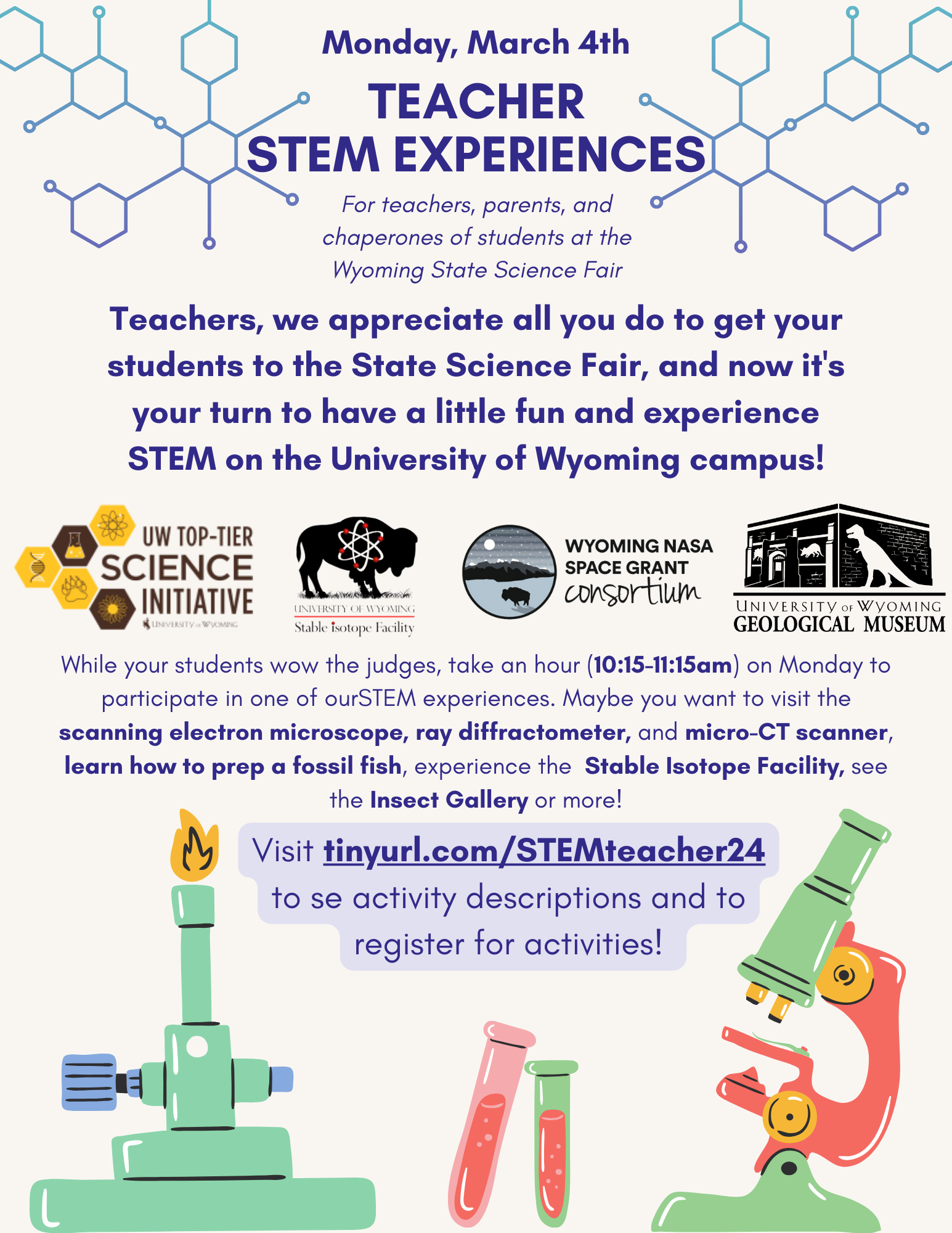
2024 Wyoming State Science Fair Activities
This page contains information about two extracurricular activities in conjunction with the Wyoming State Science Fair.
The first is the popular Pizza and Planetarium, returning on Sunday, March 3rd. For those who have participated in this event prior to last year, please note that we have changed the ticketing system to a pre-registration process. See below for more details.
The second is Teacher STEM Experiences. In the past, we have provided hands-on STEM activities for students, however since students will not need to be away from their projects for pre-judging this year (as all material will be available virtually to the judges prior to the science fair) we have decided to open this opportunity up to teachers! These activities will take place on Monday, March 4th from 10:15 – 11:15am. We are asking teachers to pre-register for the activities, see below for more details!
Pizza and Planetarium
Pizza and planetarium is BACK! Join the Wyoming NASA Space Grant and the Physics and Astronomy Department on the evening of Sunday, March 3rd for pizza, physics demos, and a planetarium show.
This year, we will be PRE-REGISTERING attendees online. (Please note this is a change from the ticketing system at registration in previous years.)
In order to pre-register your students, visit
Note that we do have enough space for all attendees, but time preferences will be given on a first-come, first-serve basis.
Pre-Registration will open at 7am on Wednesday, Feb. 14th
Pizza & Demos
You may sign up for pizza & demos at 6:30, 7:30, or 8:30.
Planetarium
You may sign up for the Planetarium at 5:30, 6:30, or 7:30
You may sign up for both the Pizza and Demos session AND the Planetarium show, but be sure to not sign up for them at the same time!

Sign up here:
tinyurl.com/2024PandP
Teacher STEM Experiences
For teachers, parents, and chaperones of students at the Wyoming State Science Fair
While your students wow the judges, take an hour (10:15-11:15am) on Monday, March 4th to participate in one of our STEM experiences!
Activity Options:
“Seeing” Science: Exploring Technology Used to Answer Questions in STEM
Come explore the new state-of-the-art Science Initiative Building on the UW campus and experience two of the instruments we use to answer various STEM research questions, the Micro-CT Scanner and the X-Ray Diffractometer. You may be familiar with a micro-CT if you or someone else you know has ever had a CAT scan at the hospital. A micro-CT is just a ‘micro’ version of a CAT scanner! It collects information about millimeter-sized objects by taking many X-ray images from different rotation angles. This allows us to generate a 3D rendering of the object, which can then be further analyzed and studied. This technology is useful to many different STEM fields, including biology, materials science, geology, archaeology, paleontology, and engineering. It allows us to see an object’s composition at the micrometer scale without cutting open or damaging a sample. You will be able to meet the researchers working with this technology who will demonstrate how we can use micro-CT scanning to help us understand the biology of the brain and the study of human diseases such as Alzheimer’s and other related dementias. The X-Ray Diffractometer can provide detailed information about the internal lattice structure of crystalline molecular solids, including unit cell dimensions, bond-lengths, bond-angles, and details of site-ordering. Overall, it can help determine the 3D structure of molecules by examining how X-rays interact with the crystals of those compounds. This technique is used widely in chemistry, molecular biology, pharmacy, physics, and chemical engineering. Teachers in this workshop will get to experience the Micro-CT scanner from 10:15-10:45am and then head up to the X-Ray Diffractometer from 10:45-11:15am. Come explore STEM with us!
Scanning Electron Microscopy (SEM) of Materials for Science Research
Introduction to the scanning electron microscopes we have on the UW campus, what kind of research can be done, and what samples/signals “look” like on the SEM
Explore the UW Geological Museum and Learn how to Prep a Fossil Fish!
Wyoming has one of the best fossil records in the world. Join our session for a tour of them museum followed by a session on how to prep a fossil fish piece, and take this knowledge back to your classroom!
You are what you eat Determining diet using Stable Isotopes.
Analyze your own breath samples on our in-house mass spectrometer and watch results in real time to see where your diet is on the carbon scale. Do you eat a lot of vegetables? or a lot of corn-fed beef? or only game animals? Are you a vegetarian? We can tell the difference with stable isotopes!
University of Wyoming Insect Gallery
Please note that this will be a self-guided tour of the collection.
The Insect Gallery includes educational displays of preserved insects (moths, butterflies, and beetles), a small Insect Zoo with living arthropods (Madagascar hissing cockroaches, crickets, walking sticks, tarantulas, millipedes, and seasonal displays of Wyoming insects), a browsing library of insect books for children, and discovery cabinet with insect-related items (insect hand stamps, nets, cocoons, beekeeping equipment).
University of Wyoming Drilling Simulator
In this state-of-the-art simulation facility, you will enjoy a variety of hands-on activities to uncover the energy resources in Wyoming and the US. You take a virtual tour to explore oil and natural gas reserves. You will engage with a full-size land drilling rig, coiled-tubing unit, wireline unit, and the only drill-ship in Wyoming. You will get your questions answered while enjoying all the movement, sounds, and operations of real offshore and onshore rigs.
All workshops require pre-registration! Sign up TODAY as many have limited capacity!


